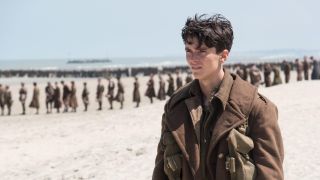GamesRadar+ Verdict
Haunting, thrilling and emotional, Dunkirk is a prestige pic with guts and glory that demands multiple views. Especially in IMAX.
Why you can trust GamesRadar+
A real-life retelling of a pivotal moment during WW2 might seem an unexpected choice for the writer/director/world-builder of original blockbuster fictions. Yet the classical, elegiac Dunkirk is still unmistakably a Christopher Nolan film. Like many of Nolan’s previous projects, it’s multi-layered, non-linear, precision-calibrated, epic in scale – and even boasts Bane himself rocking a shearling coat and shouting through a face-obscuring mask.
But while many of those clever, clockwork creations thrilled and confounded, Nolan has long been criticised for a certain clinical coldness. No such problem here – heartfelt and moving, Dunkirk may be teeth-clenching stuff, but it’s also the auteur’s most unapologetically emotional and accessible film to date… and it could be the movie to finally get him into the Oscar-winners’ circle.

Rather than take an impersonal God’s-eye overview of the events of May 1940, when 400,000 troops were pushed back by German forces to the beaches of Dunkirk to face death and defeat if they weren’t rescued, Nolan dissects his film into three separate narrative tracts. The respective strands cover land, sea and air – an approach that immerses you in the boots-on-the-ground reality for the blood-and-guts men (civilian and military) battling to change history.
After opening with a young soldier – with the aptronym Tommy (Fionn Whitehead) – escaping gunfire through the streets of Dunkirk only to arrive at the crowded, desperate beaches, those narratives unfurl in different times: the story of troops on the shore begins a week before the climax; the journey of Dorset sailor Mr. Dawson’s (Mark Rylance) sea-based rescue mission starts a day ahead; and the tale of two fighter pilots, Farrier and Collins (Tom Hardy and Jack Lowden), kicks off an hour before in the skies over the Channel.

As the stories weave in and out of each other, we see key life-threatening incidents (a downed Spitfire, a torpedoed ship, a sinking fishing boat) from different perspectives, with each replay informed by increasing investment in characters and a 360-degree understanding of the logistics at play.
The cumulative effect is both thrilling and devastating. We’re deftly shown the misinterpretations that fuelled troop hostility towards the RAF (unseen from the beach, it was assumed the fighter squadrons had simply abandoned their comrades) and the constant peril every man was in despite apparent deliverance. Think you’re safe aboard a naval medic ship? That a bailout went OK? That the proximity of help will save you in oil-slick water? Think again…
Playing as briskly and tensely as any escape thriller with mouth-agape-impressive in-camera effects, the movie constantly asks audiences to consider what they would do in a series of relentless, deadly situations while highlighting the acts of bravery, honour and kindness that exemplify the famous Dunkirk Spirit.

A white lie to protect a shell-shocked soldier here, a last-ditch fight despite running on empty there, the faith of an ordinary father speeding to save a man in memory of his fallen son… small moments in the bigger picture that build to the ultimate show of British stoicism in a flotilla of little ships as Hans Zimmer’s insistent, Shepard tone score (driven by the sampled ticking of Nolan’s own wristwatch) gives way to the stirring strains of Elgar’s emotive ‘Nimrod’ variation – challenging viewers not to shed a tear. Manipulative? Probably. Flawlessly executed? Yes.
A true ensemble piece, Dunkirk’s cast may have little dialogue, and limited individual screen time, but all are (pardon the pun) uniformly excellent – yes, cynics, even that One Direction bloke. While the young guns provide the derdoing, the more seasoned cast bring the gravitas and feels. Special mention must go to Rylance’s delightful, nuanced patriot, Hardy’s dexterity in portraying emotions from behind an oxygen mask in the confines of a cockpit and Kenneth Branagh’s Shakespearean naval commander – when, eyes brimming, he utters the word “home”, it’ll break you.
But they, of course, are not the stars of the show. What really makes Dunkirk so immediate, so visceral, are the period-correct vintage planes and boats fitted with innovative cameras to create literally breath-holding moments underwater, in the sky and on the sea.
Hoyte Van Hoytema’s beautiful, terrifying lensing – dizzying dogfights, suffocating sinkings and a cinematography-award moment when a Spitfire lands on sun-gilted sand – ensure that what could have been complicated and depressing is rendered with clarity. Thoroughly modern in its approach, yet classical in style, it’s a film that will appeal as much to Batman fans as WW2 scholars, and ultimately, the Academy come gong time.
Jane Crowther is a contributing editor to Total Film magazine, having formerly been the longtime Editor, as well as serving as the Editor-in-Chief of the Film Group here at Future Plc, which covers Total Film, SFX, and numerous TV and women's interest brands. Jane is also the vice-chair of The Critics' Circle and a BAFTA member. You'll find Jane on GamesRadar+ exploring the biggest movies in the world and living up to her reputation as one of the most authoritative voices on film in the industry.

BlizzCon is canceled again, and Blizzard hasn't really explained why - but says it's coming back "in future years"

Stellar Blade director jokes the action RPG "is the outcome of my creative dictatorship," but "everyone pretends to listen to what I say whilst creating what they want"

The Stellar Blade dev team had a "competition" to see who could beat a boss first: "From that moment, all of us understood how to design the combat"
